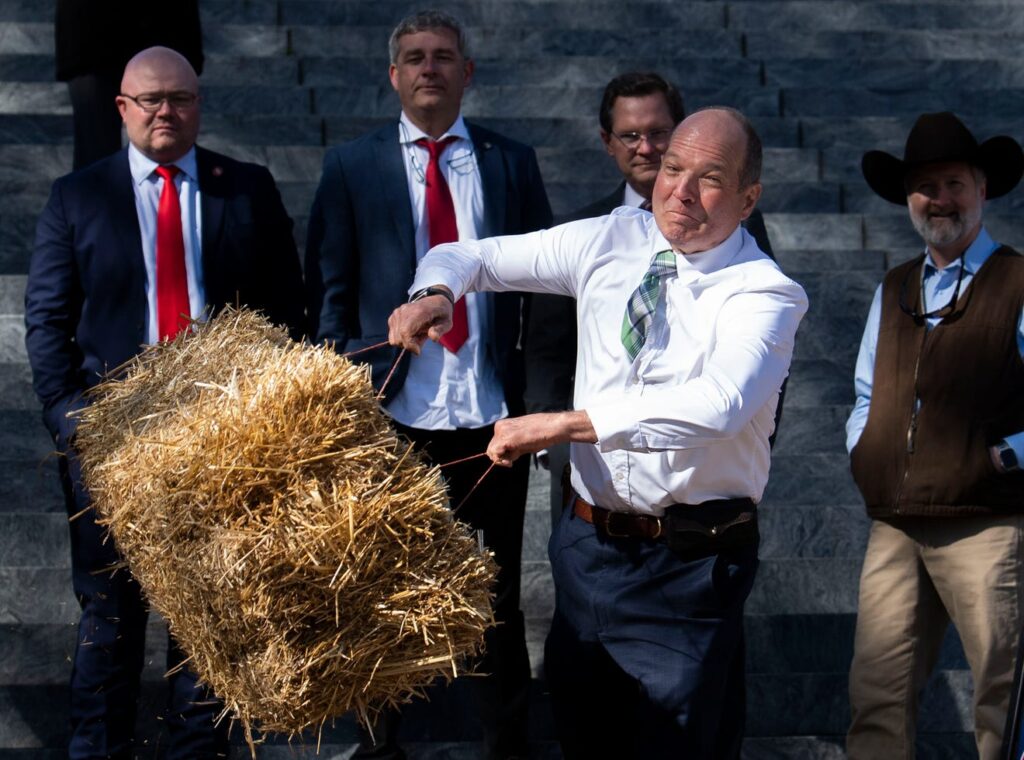
Event at State Capitol Spotlights Agriculture
Today is National Ag Day, which means the Tennessee State Capitol will hold the annual Ag Day on the Hill to highlight Tennessee agriculture.
National Ag Day, organized by the Agriculture Council of America, shines a light on the nation’s agriculture industry. The Tennessee State Capitol takes part in National Ag Day by holding Ag Day on the Hill with recreational activities and a House Ag Subcommittee meeting.
Global economic influence contributed to a decrease in Tennessee’s agriculture revenue in 2023, according to the University of Tennessee Institute of Agriculture, dropping the price of corn, cotton, soybean and wheat, below the five-year average despite huge crop yields.
Here’s what to know about National Ag Day and Ag Day on the Hill in Tennessee.
What is the goal of National Ag Day?
National Ag Day recognizes the 2% of the American population that produces most of the nation’s food and is part of National Ag Week.
“It’s a day to recognize and celebrate the abundance provided by agriculture,” according to the National Ag Day website. “Every year, producers, agricultural associations, corporations, universities, government agencies and countless others across America join together to recognize the contributions of agriculture.”
Educational aspects include understanding how food and fiber products are produced and how agriculture helps maintain a strong economy.
What to know about Ag Day on the Hill at the Tennessee State Capitol
Tennessee agriculture is recognized on the Tennessee state seal, with a plow and the sheaf of a wheat and a cotton stalk, so there is a natural connection between Capitol Hill and National Ag Day.
Ag Day on the Hill began 16 years ago. Past activities have included shucking corn and guest appearances by farm animals. Each year a contest — which is not made public until the day of — takes place. Past contests include timber-cutting and cow-milking.

Last year during Ag Day on the Hill, 19,000 pounds of sweet potatoes were bagged and distributed to Nashville area churches and food kitchens, as well as food pantries across 12 Middle Tennessee counties.
This year, the Tennessee Agri-Tourism Association organized a straw bale throwing contest between Gov. Bill Lee, House Speaker Cameron Sexton, Attorney General Jonathan Skrmetti, Agriculture Commissioner Charlie Hatcher, and several members of the General Assembly.
After throws by four teams representing the House, Senate, executive branch, and Attorney General’s office, Sens. Page Walley, R-Savannah, and Adam Lowe, R-Calhoun were crowned “Tennessee Straw Toss Titans” ― having tossed a 33-pound straw bale a combined distance of 57.8 feet.

Even in Nashville, agriculture is visible in the middle of the city. Tennessee State’s agricultural program has more than doubled in the past 10 years, with a huge acreage visible from Ed Temple Boulevard.
What are the top 5 Tennessee agricultural commodities?
Soybeans yielded the most value of Tennessee agriculture production in 2023 at $1.09 billion, according to the United States Department of Agriculture (USDA).
Broiler chickens ($973 million), corn ($691 million), cattle ($687 million) and hay ($549,710,000) were the next most profitable.
Other top Tennessee agriculture commodities include wheat, cotton, tobacco, fresh-market tomatoes and dairy products.
How many farms are in Tennessee?
There were 63,100 farms in Tennessee in 2023, according to the USDA. The operations yielded crops and livestock worth $4.5 billion in production value. The total economic impact was $89 billion, according to the Tennessee Farm Bureau.
A portion of the crop yield is sold direct to consumers at Tennessee’s 129 farmers markets.
What percentage of Tennessee is farmland?
Tennessee agriculture is more prevalent than people might think. Farmland makes up 39.6% of the state’s land, according to the Tennessee Farm Bureau.
Read more at The Tennessean.